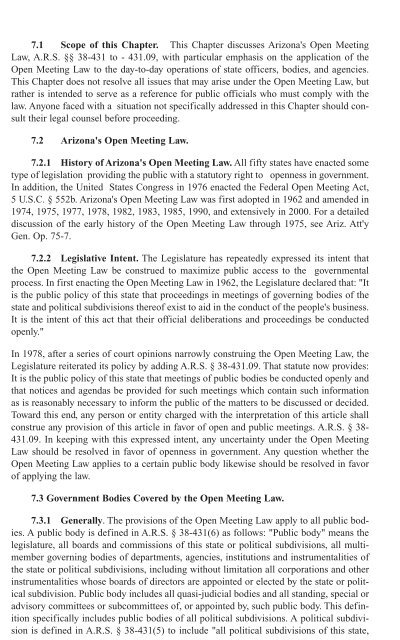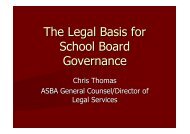The Arizona Open Meeting Law - Arizona School Boards Association
The Arizona Open Meeting Law - Arizona School Boards Association
The Arizona Open Meeting Law - Arizona School Boards Association
Create successful ePaper yourself
Turn your PDF publications into a flip-book with our unique Google optimized e-Paper software.
7.1 Scope of this Chapter. This Chapter discusses <strong>Arizona</strong>'s <strong>Open</strong> <strong>Meeting</strong><br />
<strong>Law</strong>, A.R.S. §§ 38-431 to - 431.09, with particular emphasis on the application of the<br />
<strong>Open</strong> <strong>Meeting</strong> <strong>Law</strong> to the day-to-day operations of state officers, bodies, and agencies.<br />
This Chapter does not resolve all issues that may arise under the <strong>Open</strong> <strong>Meeting</strong> <strong>Law</strong>, but<br />
rather is intended to serve as a reference for public officials who must comply with the<br />
law. Anyone faced with a situation not specifically addressed in this Chapter should consult<br />
their legal counsel before proceeding.<br />
7.2 <strong>Arizona</strong>'s <strong>Open</strong> <strong>Meeting</strong> <strong>Law</strong>.<br />
7.2.1 History of <strong>Arizona</strong>'s <strong>Open</strong> <strong>Meeting</strong> <strong>Law</strong>. All fifty states have enacted some<br />
type of legislation providing the public with a statutory right to openness in government.<br />
In addition, the United States Congress in 1976 enacted the Federal <strong>Open</strong> <strong>Meeting</strong> Act,<br />
5 U.S.C. § 552b. <strong>Arizona</strong>'s <strong>Open</strong> <strong>Meeting</strong> <strong>Law</strong> was first adopted in 1962 and amended in<br />
1974, 1975, 1977, 1978, 1982, 1983, 1985, 1990, and extensively in 2000. For a detailed<br />
discussion of the early history of the <strong>Open</strong> <strong>Meeting</strong> <strong>Law</strong> through 1975, see Ariz. Att'y<br />
Gen. Op. 75-7.<br />
7.2.2 Legislative Intent. <strong>The</strong> Legislature has repeatedly expressed its intent that<br />
the <strong>Open</strong> <strong>Meeting</strong> <strong>Law</strong> be construed to maximize public access to the governmental<br />
process. In first enacting the <strong>Open</strong> <strong>Meeting</strong> <strong>Law</strong> in 1962, the Legislature declared that: "It<br />
is the public policy of this state that proceedings in meetings of governing bodies of the<br />
state and political subdivisions thereof exist to aid in the conduct of the people's business.<br />
It is the intent of this act that their official deliberations and proceedings be conducted<br />
openly."<br />
In 1978, after a series of court opinions narrowly construing the <strong>Open</strong> <strong>Meeting</strong> <strong>Law</strong>, the<br />
Legislature reiterated its policy by adding A.R.S. § 38-431.09. That statute now provides:<br />
It is the public policy of this state that meetings of public bodies be conducted openly and<br />
that notices and agendas be provided for such meetings which contain such information<br />
as is reasonably necessary to inform the public of the matters to be discussed or decided.<br />
Toward this end, any person or entity charged with the interpretation of this article shall<br />
construe any provision of this article in favor of open and public meetings. A.R.S. § 38-<br />
431.09. In keeping with this expressed intent, any uncertainty under the <strong>Open</strong> <strong>Meeting</strong><br />
<strong>Law</strong> should be resolved in favor of openness in government. Any question whether the<br />
<strong>Open</strong> <strong>Meeting</strong> <strong>Law</strong> applies to a certain public body likewise should be resolved in favor<br />
of applying the law.<br />
7.3 Government Bodies Covered by the <strong>Open</strong> <strong>Meeting</strong> <strong>Law</strong>.<br />
7.3.1 Generally. <strong>The</strong> provisions of the <strong>Open</strong> <strong>Meeting</strong> <strong>Law</strong> apply to all public bodies.<br />
A public body is defined in A.R.S. § 38-431(6) as follows: "Public body" means the<br />
legislature, all boards and commissions of this state or political subdivisions, all multimember<br />
governing bodies of departments, agencies, institutions and instrumentalities of<br />
the state or political subdivisions, including without limitation all corporations and other<br />
instrumentalities whose boards of directors are appointed or elected by the state or political<br />
subdivision. Public body includes all quasi-judicial bodies and all standing, special or<br />
advisory committees or subcommittees of, or appointed by, such public body. This definition<br />
specifically includes public bodies of all political subdivisions. A political subdivision<br />
is defined in A.R.S. § 38-431(5) to include "all political subdivisions of this state,<br />
- 21 -



